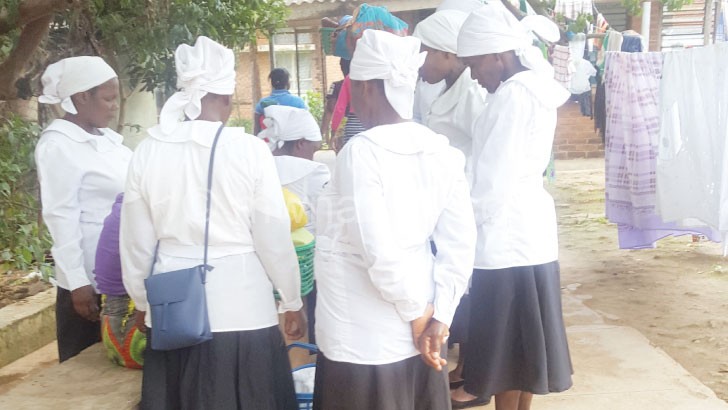Covid-19 restores hospital hygiene
It is Monday noon, a visiting hour at Queen Elizabeth Central Hospital (QECH) in Blantyre.
As usual, people are trickling in to cheer patients admitted to Southern Region’s largest referral hospital.
But there is something unusual happening as the nation grapples to prevent the worldwide spread of coronavirus.
Both the corridors and the wards are not overcrowded. One can easily make their way to the sickbeds as not many people are entering the hospital. Besides, every entrance is equipped with a large bucket of water where security guards order everyone entering or leaving the hospital to wash their hands with soap.

And that is not all. Every patient is only allowed one guardian and when the visitors reach the wards, they are not allowed to enter. Instead, they just give the name of the patient and a guard disappears into the wards to fetch them.
Mostly, it is the guardians who come to either collect foodstuffs brought by the visitors and brief them how the patient is feeling. Only patients, who can walk, are coming out to have a word or two with the visitors.
There are also 20-litre buckets of water and soap at the ward entrances. The guardians and patients have to wash their hands before they part ways.
Nevertheless, some visitors aren’t wasting time at the entrances, exposing patients to the fast-spreading virus as they go behind the wards to deliver their parcels through windows.
This contradicts notices on hospital walls that spell out these precautionary measures to beat the global outbreak spreading in neighbouring Tanzania, Zambia and Mozambique.
“As part of infection prevention, no visitors will be allowed into the wards,” reads the notice.
Coronavirus infection, codenamed Covid-19, has affected about 430 000 people and killed over 19 000 worldwide. In Africa, 43 countries out of 54 have reported more than 2 000 cases. Malawi is among four southern African countries without confirmed cases.
However, not all visitors are amused with the new dos and don’ts at QECH and other major hospitals.
Most people seen sitting on the lawns do not seem to understand why they have to travel from their homes only to be barred from entering the hospital.
Says Maness Simtekeseka, who came to visit a relative admitted to Ward 4A: “I travelled all the way from Kachere Township, but couldn’t make it into the ward. The hospital authorities could have just come out plainly to state that they are banning visitors.
“It’s not fair. As it is, I am sure that many people will stop coming to check on their relatives very soon. I just hope the hospital is ready to provide the patients and guardians with food.”
Tianna Chaima, from BCA, was caught unawares as there was no formal announcement of the new arrangements on local radio stations and in newspapers.
“I have learnt about the new arrangement today. My 10-year-old brother has been in hospital for three months now and all this time I was entering the Sobo Ward to see him without any restrictions.
Since Saturday, the guards have been implementing these measures to decongest the hospital in view of the virus transmitted through droplets when an infected coughs, sneezes and speaks. It also spreads when one touches contaminated surfaces and the mouth, nose and eyes without washing hands with soap.
The high risk of spreading through crowded settings has forced government to ban gatherings of at least 100 people and suspend learning in schools.
Chaima said the precautionary measures being implemented in hospitals are understandable considering that the deadly outbreak is close to home.
QECH director Dr Samson Mndolo says authorities understand that people want to see their loved ones, but the administration will strictly enforce the preventive measures and revisit the decision as the outbreak unfolds.
“Here is a virus spreading like wildlife. Reducing overcrowding is one way of stopping it from coming [into the country]. Visitors and guardians contribute significantly to overcrowding in the wards,” he says.
While some visitors detest social distancing in hospitals, health workers say it is timely and has lessened their work.
A guard at one of the wards in the hospital on Monday said the restrictions have brought sanity to the wards.
“Visiting hours are usually chaotic, people always jostle to enter the wards first. Sometimes, we fail to control people and the wards become overcrowded. Now people have no choice; they just have to comply,” says the guard.
Dr Gift Kawalazira, director of health and social services in Blantyre, says most people are complying with the precautionary measure, including washing hands with soap, because they are afraid of the virus. The measures are in force at QECH and all centres.
“What happens with human behaviour is that people usually cooperate when they are afraid. So, I think the fear factor is working to our advantage, people seem to be cooperative when it comes to washing their hands with soap before and after entering hospitals and wards,” he states.
For the medical doctor, hand washing is the most basic and effective preventive measure.
The situation is the same at almost all major hospitals across the country.
Starting last weekend, hospital visitors were barred from entering wards during lunch hour at Likuni Mission Hospital, Bwaila Hospital and Kamuzu Central Hospital.
At Thyolo District Hospital and its satellite centres, restriction of patient flow and reinforcement of one guardian per patient is also being enforced.
The district’s health officer Dr Arnold Jumbe said other measures being undertaken include one visitation per day for all patients and provision of handwash and sanitiser at all entry and exit points.





